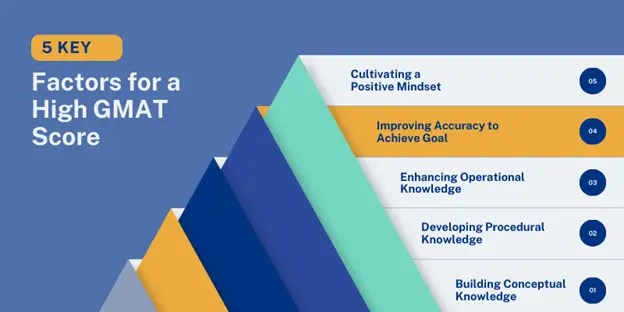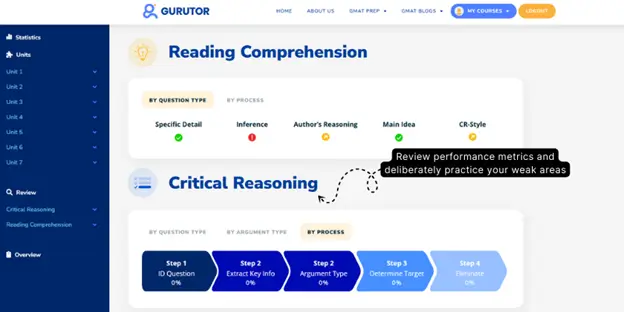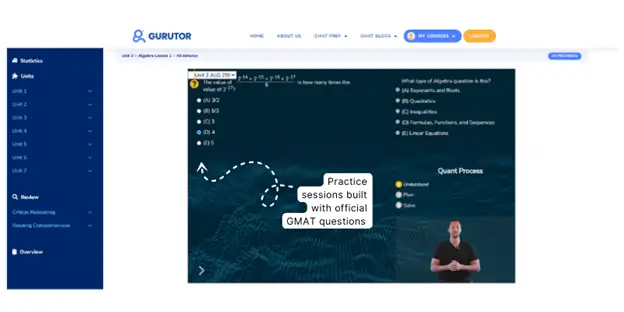Key Factors for a High GMAT Score

If you’re applying to business school, the GMAT isn’t just another test, it’s a gatekeeper.
For ambitious applicants, that reality brings real pressure as one number can feel like the difference between acceptance and rejection.
The challenge is familiar. Not enough time to study. A score that plateaus despite long hours of prep. Unstructured practice that leaves gaps. Mock exams that don’t feel anything like the real test.
These frustrations derail even the most motivated candidates.
Knowing the GMAT test format and content is necessary, but it’s not enough.
The students who consistently break into the 700+ range go further. They pair strong content knowledge with realistic test habits, timed practice, and a study plan that targets their personal bottlenecks.
5 Key Factors for a High GMAT Score
In this guide, we will explore the key factors for a high GMAT score, from building solid foundations to practicing under real exam conditions.

1. Building Conceptual Knowledge
Before you can push into advanced GMAT strategies, you need a rock-solid foundation, as most score plateaus come from weak foundations.
Conceptual knowledge is simply your command of the basic facts, rules, and frameworks that every GMAT question is built on.
Understanding Basic Facts and Rules
Think of it as the grammar of the test, without it, you can’t “speak” the GMAT language fluently.
On test day, the exam will pull directly from skills you first learned in high school: arithmetic, algebra, and geometry in Quant; grammar and logical reasoning in Verbal; and chart or table interpretation in Data Insights.
And you won’t get to 700+ if sentence structure or parallelism rules still trip you up.
The first phase of your prep should focus on each topic methodically, closing every gap instead of just grinding random questions.
Identifying Key Topics
Here’s where to put your energy during conceptual review:
- Quantitative Reasoning: Arithmetic, ratios and proportions, algebra, number properties, geometry, and basic statistics.
- Verbal Reasoning: Grammar rules for Sentence Correction, strategies for Reading Comprehension, and Critical Reasoning concepts (assumptions, strengthen/weaken, inference).
- Data Insights: Chart and table interpretation, graphic analysis, multi-source reasoning, two-part analysis, and data sufficiency.
The GMAT rewards application of these concepts, not memorization.
2. Developing Procedural Knowledge
Once you know the basics, the next step is practice.
Procedural knowledge is your ability to apply what you know and achieveacheive a high GMAT score.
In other words, it’s one thing to recognize a concept; it’s another to execute the steps to solve a problem under exam conditions.
To build this, you must work through lots of practice problems.
Applying Concepts to Solve Problems
Practice problems are where raw knowledge becomes usable skill.
Every time you solve a GMAT-style question, you’re reinforcing the solution process and strengthening recall.
To make this effective:
- Work problems on paper: Don’t just nod along with solutions, force yourself to write out each step.
- Mix topics: After learning a new concept, apply it to several problems of increasing difficulty, then combine it with other topics.
- Treat every problem like a drill: Even a single question is practice for pacing, accuracy, and execution.
This approach prevents the “I thought I knew this” trap that catches many test-takers when recognition doesn’t translate to performance.
Practice with Realistic GMAT Questions
Not all practice is equal. To build procedural fluency, focus on official or high-quality materials:
- GMAT Official Starter Kit (mba.com): Free, with 90 real, retired questions and two full-length practice tests.
- GMAT Official Guide: Hundreds of authentic practice problems across Quant, Verbal, and Data Insights.
Working with these questions ensures you’re training on the exact wording, logic, and scoring style you’ll face on test day.
And here’s where Gurutor stands apart: the platform is built on official GMAT questions combined with tutor-quality guidance. That means every practice session trains you on the real exam, not just lookalike problems.

Gradual Increase in Difficulty
Start with easy and medium-level problems to cement the process. Then, push into harder sets that test endurance and expose weaknesses.
This progression sharpens problem-solving instincts and prepares you for the toughest 700+ level questions.
3. Enhancing Operational Knowledge
Operational knowledge is about delivering your best performance under test-day conditions.
It involves taking everything you’ve learned and practiced, and executing it consistently on a full, timed GMAT exam.
Thus, the only way to build this is to simulate the GMAT experience as closely as possible.
Simulating Test-Day Conditions
Full-length, timed practice tests are essential. They train your mind, pacing, and stamina for the real exam.
To get the most out of them:
- Recreate exam rules: No extra notes, no outside breaks, and no calculator.
- Control your environment: Sit in a quiet space, set strict section timers, and follow the official order of sections.
- Review beyond mistakes: Analyze pacing, fatigue, and moments of anxiety, not just wrong answers.
With Gurutor’s built-in immediate feedback, you don’t just see the right answer; you understand why you struggled, where time slipped away, and how to adjust before it happens again on test day.

Managing Time Effectively
Without strong timing skills, even advanced students hit a score ceiling.
The key principles include:
- 2–2.5 minutes per question: If you’re stuck, make a smart guess and move on; leaving questions blank is worse.
- Use timed drills: Build pacing into your study early by timing problem sets or short quizzes.
- Make timing automatic: With enough practice, you’ll instinctively know how long to spend before moving on.
Remember: effective time management isn’t something to “fix” at the end; it’s a skill you should practice from the start.
4. Improving Accuracy
Even small errors can drag down your scaled score, especially when they happen on easier questions that the algorithm expects you to get right.
Thus, improving accuracy means slowing down just enough to avoid careless mistakes, while sharpening your analytical skills so you consistently choose the best answer.
Avoiding Careless Mistakes
A single slip can cost more than a tough problem left unanswered. To keep errors to a minimum:
- Read carefully: Underline or jot down what’s being asked, and watch for traps like “NOT” or “EXCEPT.”
- Check calculations: Re-add or verify results when time allows to catch small arithmetic mistakes.
- Stay alert in Verbal: Don’t jump to conclusions, fully understand the passage, argument, or sentence before eliminating answers.
- Keep an error log: Mark every miss or slow question, then analyze whether it came from a content gap, miscalculation, or misreading.
- Don’t get complacent: Even in your strongest areas, treat every problem with focus. Easy questions can be lost to overconfidence.
Developing Strong Analytical Skills
Accuracy also comes from clear, structured reasoning. The GMAT rewards how you think as much as what you know.
To build this skill:
- Break problems into steps, identify the type, recall the right strategy, and execute carefully.
- In Critical Reasoning, focus on the logic of the argument, not just the surface wording.
- In Data Insights, practice extracting trends from charts and tables without rushing.
- Don’t just memorize the right answer, understand why it works and why the wrong ones don’t.
Over time, this process trains your critical thinking under pressure.
You’ll quickly recognize the most logical path to the answer, avoiding the small but costly mistakes that separate average scores from 700+.
5. Cultivating a Positive Mindset
Your mindset is just as important as your study plan. Confidence and optimism directly affect how you perform under pressure.
Building Confidence
Almost every successful test-taker feels stress. Even top scorers miss problems.
Here are some of the practical ways to boost confidence:
- Reframe anxiety as excitement: Try telling yourself “I’m excited” instead of “I’m stressed” to improve your focus.
- Develop a test-day routine: Use positive self-talk (“I’ve prepared for this”), deep breathing, and a one-question-at-a-time mindset.
- Recall past wins: Remind yourself of tough goals you’ve already achieved, which builds trust in your ability to succeed again.
Staying Motivated
When motivation dips (and it will), lean on support: friends, family, or online GMAT communities that remind you you’re not in this alone.
To keep motivation steady:
- Set a clear target score aligned with your MBA goals.
- Track progress through practice test results and milestones.
- Block study time, but also protect rest and downtime to prevent burnout.
- Sleep, nutrition, and planned breaks improve memory and focus.
- A good GMAT score opens doors to top MBA programs and career advancement.
Conclusion
A high GMAT score doesn’t come from one single strategy, it’s the result of combining several key factors.
Start by mastering the fundamentals across Quant, Verbal, and Data Insights so you have a strong conceptual base.
Then, build procedural strength with targeted practice, especially by using official GMAT questions and full-length practice tests.
Also, take time to simulate real exam conditions to sharpen pacing, build stamina, and manage stress effectively.
Along the way, focus on accuracy by reviewing not just what you got wrong, but why, spotting patterns in your errors, and addressing them.
Equally important is your mindset. Stay motivated by keeping your MBA goals front and center, and remember: you don’t need perfection to earn a top score.
Confidence, consistency, and resilience can carry you through the toughest parts of prep.
From Concept to Confidence: Master the GMAT With Gurutor
Don’t let guesswork or unstructured prep hold you back.
Gurutor combines officially licensed GMAT questions, step-by-step guidance, and real-time feedback to help you study efficiently, fix mistakes instantly, and build the confidence to tackle even the toughest questions.
Start today and take the fastest path to your target score.
